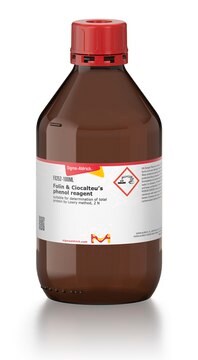223530
Sodium carbonate
powder, ≥99.5%, ACS reagent
Synonym(s):
Calcined soda, Carbonic acid disodium salt, Soda ash
About This Item
Recommended Products
grade
ACS reagent
Quality Level
Agency
suitable for EPA 300
suitable for SM 2310
suitable for SM 2320
suitable for SM 4500 - NH3
Assay
≥99.5%
form
powder
impurities
≤0.005% silica
≤0.01% insolubles
loss
≤1.0% loss on heating
pH
12 (25 °C, 106 g/L)
mp
851 °C (lit.)
anion traces
chloride (Cl-): ≤0.001%
phosphate (PO43-): ≤0.001%
sulfur compounds (as SO42-): ≤0.003%
cation traces
Ca: ≤0.03%
Fe: ≤5 ppm
K: ≤0.005%
Mg: ≤0.005%
heavy metals: ≤5 ppm (by ICP-OES)
SMILES string
O=C(O[Na])O[Na]
InChI
1S/CH2O3.2Na/c2-1(3)4;;/h(H2,2,3,4);;/q;2*+1/p-2
InChI key
CDBYLPFSWZWCQE-UHFFFAOYSA-L
Looking for similar products? Visit Product Comparison Guide
General description
Application
- As a catalyst in the aldol condensation of aldehydes with ketones in the synthesis of chalcone and azachalcone.
- As a pH stabilizer agent in the synthesis of FeO-NPs (iron oxide nanoparticles) in the presence of cymbopogon citratus as a reducing agent.
- As a base in the Pd-catalyzed Suzuki coupling reactions.
- As a base in the transition metal free Suzuki coupling reaction of aryl halides and arylboronic acids to form biaryls using water as a solvent and TBAB (tetrabutylammonium bromide) as a phase-transfer catalyst.
Biochem/physiol Actions
Other Notes
Legal Information
Signal Word
Warning
Hazard Statements
Precautionary Statements
Hazard Classifications
Eye Irrit. 2
Storage Class Code
11 - Combustible Solids
WGK
WGK 1
Flash Point(F)
Not applicable
Flash Point(C)
Not applicable
Certificates of Analysis (COA)
Search for Certificates of Analysis (COA) by entering the products Lot/Batch Number. Lot and Batch Numbers can be found on a product’s label following the words ‘Lot’ or ‘Batch’.
Already Own This Product?
Find documentation for the products that you have recently purchased in the Document Library.
Customers Also Viewed
Our team of scientists has experience in all areas of research including Life Science, Material Science, Chemical Synthesis, Chromatography, Analytical and many others.
Contact Technical Service



